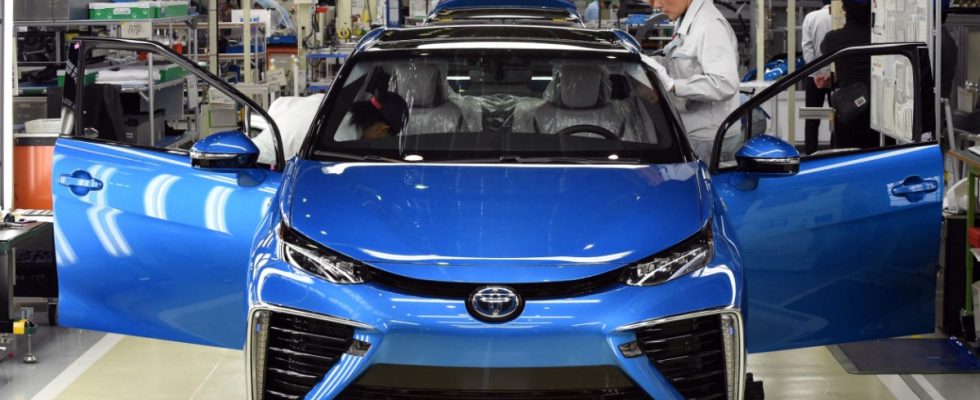This free time, with which many Toyota employees suddenly stood there on Tuesday, somehow didn’t feel right. Because it was not normal that Japan’s largest car manufacturer initially closed twelve of its plants in the island state and in the evening also stopped assembly operations in the last two active ones in Fukuoka and Kyoto. There is a problem in the computer system, the necessary car parts can no longer be ordered, the company said and sent its people home. “I don’t know the cause, but I hope that operations will resume soon,” said an employee who was intercepted by broadcaster NHK in front of the Motomachi plant in Toyota City, Aichi Prefecture, in the morning. And soon there was speculation that a new cyber attack had temporarily paralyzed Toyota.
Japan’s Economy Minister Yasutoshi Nishimura later said Toyota “does not believe at this point in time that the problem was caused by a cyber attack.” But that didn’t change the fact that the event gave the nation a renewed sense of just how vulnerable even a giant of Japan’s economy can be.
Toyota is Japan’s largest taxpayer and employer
So important is Toyota’s importance to Japan that an entire city was set aside for the company, said Toyota City, which was called Koromo until 1959. Toyota is not only Japan’s largest taxpayer and employer, but as the largest automobile company in the world, it is also the most prominent representative of Japanese craftsmanship. Anyone who wants to harm the export nation can easily get the idea of attacking Toyota. That, in turn, could be what countries like Russia and China want because the US partner Japan is following the trend towards rearmament. And the anger has only increased since Japan’s largest electricity company Tepco started dumping treated cooling water from the defunct Fukushima Daiichi nuclear power plant into the sea last week.
Japan sees itself increasingly threatened by sabotage from the Internet. The National Police Agency reported a record 12,369 detected cybercrime cases in 2022. The number of attacks using so-called ransomware alone, i.e. blackmail programs that intruders use to practically lock computer owners out of their own systems, increased by 58 percent compared to the previous year. Most hackers are after money, others have more in mind than just mere enrichment. In August, cyber security firm NTT Security Japan reported that international hacker group Anonymous had launched attacks on nuclear power groups in protest at the discharge of treated cooling water from Fukushima Daiichi. And recent cyberattacks on pillars of Japan’s economy were obviously meant to harm the nation as a whole.
“This incident highlights how seriously critical infrastructure is at risk in the digital age.”
At the beginning of March 2022, Toyota had to close its 14 factories in Japan. The reason was a cyber attack on the supplier Kojima Industries. The production of about 13,000 vehicles was affected. At the beginning of July, operations at the port of Nagoya came to a standstill because a ransomware attack prevented the loading and unloading of containers. Toyota was also affected. Nagoya’s port, located very close to Toyota City, is an important hub for the company and the largest port in Japan. Experts interpreted the events in Nagoya as a warning. “This incident makes it clear how seriously important infrastructures are at risk in the digital age,” said Craig Jones, vice president for security at the American software developer continuous.
The subject is sensitive. That’s probably why Toyota didn’t want to fuel speculation about a cyber attack. Uncertainty lay over the company like a thundercloud on Tuesday. It was not clear until the evening when operations in its factories would resume. The Toyota workers could certainly have done without this kind of leisure time.

